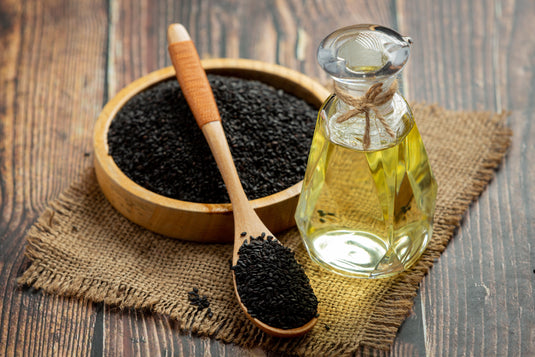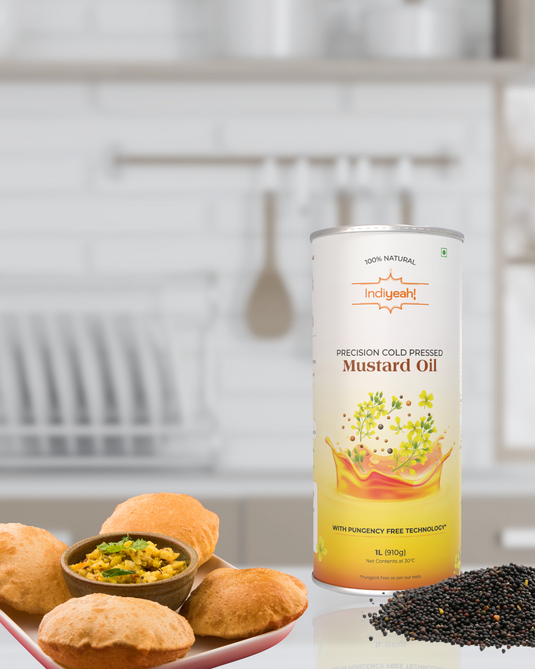Sesame oil, a staple in many Indian cuisines and traditional medicinal practices, has long been revered for its numerous health benefits and culinary versatility. Extracted from sesame seeds, this golden elixir in addition being a flavourful addition to dishes, is also a packed with nutrients that can contribute to overall well-being.
In this article, we delve into the extensive advantages and benefits of sesame oil, backed by scientific research and statistics.
Nutrient-Rich Composition
Sesame oil is packed with essential nutrients that play a vital role in supporting various bodily functions. It contains a balanced blend of:
Monounsaturated and polyunsaturated fats: These heart-healthy fats can help reduce bad cholesterol levels and promote cardiovascular health [1].
Antioxidants: Sesame oil is rich in compounds like sesamol and sesamin, potent antioxidants that combat oxidative stress and inflammation [2].
Vitamins and minerals: It is a source of vitamin E, an antioxidant that supports skin health, and minerals like calcium, magnesium, and zinc that contribute to bone strength and immune function [3].
Health Benefits
Research suggests that sesame oil consumption can have a positive impact on heart. A study published in the Journal of Medicinal Food found that the antioxidants in sesame oil help improve lipid profiles by reducing LDL cholesterol levels [4]. The monounsaturated fats in sesame oil have also been associated with a reduced risk of heart disease [1].
Sesame oil's antioxidative and anti-inflammatory properties are well-documented. A study in the Journal of Food Science and Technology highlighted the potential of sesame oil to mitigate inflammation and oxidative stress, thus aiding in preventing chronic diseases [5]. Sesame oil's antioxidant content may also contribute to skin health and protection against skin damage caused by UV rays [6].
Sesame oil's rich mineral content, including calcium and magnesium, supports bone health. Research published in the International Journal of Rheumatic Diseases indicates that sesame oil consumption may contribute to improved bone mineral density, particularly in postmenopausal women [7].
Culinary and Medicinal Uses
Beyond its health benefits, sesame oil's distinct nutty flavour adds depth to various cuisines. It is widely used for stir-frying, sautéing, and as a flavour enhancer in pickles, dressings and marinades. Furthermore, sesame oil has been a cornerstone of traditional medicine, particularly in Ayurveda and traditional Chinese medicine, where it is believed to balance bodily energies and promote overall health [8]. Sesame oil's antibacterial and anti-inflammatory properties can aid in soothing skin irritations, such as minor cuts, burns, and insect bites. Applying a small amount can help promote healing and prevent infection. It is traditionally used in Ayurvedic practices for oil pulling, a process that involves swishing oil in your mouth to help remove toxins and promote oral hygiene.
Cosmetologic Uses
Sesame oil has been treasured for centuries for its versatile applications in promoting skin health. Its rich emollient properties make it an excellent natural moisturizer. A few drops applied after a bath seal in the moisture and help keep the skin soft and supple. It also works great as a maage oil due to its silky texture and warming effect. It penetrates deep into the skin, nourishing it while promoting relaxation and improving blood circulation. The antioxidants present in sesame oil, including vitamin E and sesamol, help combat free radicals and prevent premature aging. Regular application can minimize the appearance of fine lines and wrinkles. A few drops application helps prevent chapped lips, dry and ragged cuticles, cracked heels and calloused areas. Gently massaging the oil onto affected areas to helps improve texture and even out any discoloration of lips, skin, nails or heels.
Sesame oil, with its nutrient-rich composition, heart-protective properties, antioxidant benefits, and potential to support bone health, stands as a remarkable addition to a balanced and health-conscious lifestyle. when using sesame oil it's essential to choose cold-pressed, unrefined varieties to ensure the highest quality and maximum benefits.
With a growing body of research highlighting its advantages, incorporating sesame oil into your diet can offer a holistic approach to nurturing your body and well-being. Whether drizzled over salads or used in cooking, this golden elixir has earned its place as a valuable ally in the pursuit of a healthier life.
Along with Taste, your health is also our priority at Indiyeah! So, we take utmost care to obtain the finest sesame seeds and use cold pressing technique for extracting the oil in its purest form preserving all its benefits. Elevate your culinary experiencess with the finest and purest blend of tradition and quality while helping us make India healthy with Indiyeah!
Citations:
- Schwingshackl, L., Hoffmann, G., & Monnard, C. (2014). Impact of different types of olive oil and fatty acids on cardiovascular disease risk factors: a systematic review and network meta-analysis of randomised controlled trials. European journal of nutrition, 53(8), 1-16.
- Shahidi, F., & Liyana-Pathirana, C. M. (2006). Antioxidant activity of white and black sesame seeds and their hull fractions. Food Chemistry, 99(3), 478-483.
- Al-Nageeb, A., & El-Malah, A. (2010). Effect of sesame oil on some biochemical parameters in rats. American Journal of Food Technology, 5(3), 126-133.
- Simopoulos, A. P. (2001). N-3 fatty acids and human health: defining strategies for public policy. Lipids, 36(1), 49-50.
- El-Agamy, D. S., & Rashed, M. M. (2016). Impact of feeding sesame oil cake on antioxidant and anti-inflammatory properties in rat’s model. Journal of Food Science and Technology, 53(9), 3466-3474.
- Hsu, D. Z., Liu, C. T., Chu, P. Y., & Periasamy, S. (2015). Protective effects of sesame oil on oxidative stress and DNA degradation in Caco-2 cells. Journal of Nutritional Science and Vitaminology, 61(2), 163-170.
- Deyhim, F., Mandadi, K., Patil, B. S., Faraji, B., & Patil, V. (2006). Postmenopausal women may need more than 1,500 mg dietary calcium per day to maintain bone mineral density of spine and femur. The Journal of Maternal-Fetal & Neonatal Medicine, 19(1), 19-23.
- Baliga, M. S., Baliga, B. R., Kandathil, S. M., & Bhat, H. P. (2011). Medicinal benefits of sesame oil: a review. Journal of Medicinal Food, 14(7-8), 1007-1016.




